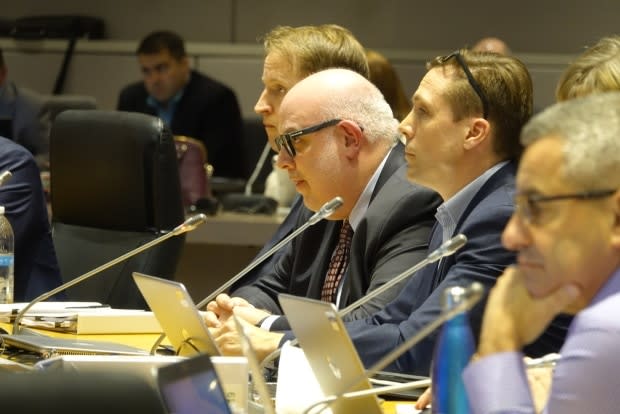SNC-Lavalin's 'poor' LRT bid should have been tossed, evaluators found

SNC-Lavalin was awarded the $1.6-billion contract to extend Ottawa's north-south Trillium Line last March even though the team assembled to assess the bids reached a "unanimous consensus that the proposal should not be considered further in the evaluation process," according to documents released by the city Thursday night.
The SNC-Lavalin bid failed to include a signalling and train control system, had no plan for snow removal and, at one point, appeared to believe the trains that run on the Trillium Line were electric, not diesel.
The evaluation team concluded the bid was a "poor technical submission throughout," and that "resolving all of the major issues identified in the submission would be a lengthy and likely impractical process."
It was also critical of SNC-Lavalin for not being able to provide a plan for using the Trillium Line's existing fleet of Alstom LINT diesel trains in the future — something the other two finalists, Trillium Extension Alliance and Transit Link, were able to provide. The technical team called the omission a "fatal flaw."
On Oct. 3, the team concluded SNC-Lavalin's proposal "failed all four technical categories."

City executives used discretion
CBC Ottawa first reported back in March 2019 that SNC-Lavalin failed to meet the minimum technical score of 70 per cent that appeared to be required for a firm to continue in the competition, but still managed to win it.
In August 2019, the city finally admitted it was true. SNC-Lavalin had failed to score 70 per cent not just once, but twice: the company, operating under the name TransitNEXT, scored 63 per cent; the team was directed to rescore the bidders, but SNC-Lavalin still only scored 67 per cent.
A secret clause in the request for proposals (RFP) allowed the city's senior management team to wave a bidder onto the financial round, even if that bidder didn't score 70 per cent in the technical evaluation. The city's senior executive team exercised this discretion — without knowing the identity of the bidder, they say — following the advice of Geoff Gilbert, a Norton Rose Fulbright lawyer hired by the city to oversee the procurement of the contracts for LRT Stage 2.
Contrary to the technical evaluation team's advice, SNC-Lavalin's bid was allowed to move to the next phase of the evaluation process: the financial scoring. Because its bid was so much cheaper than its competitors, SNC-Lavalin was the put forward as the preferred proponent, and council approved the contract in March 2019.
Ottawa officials say the SNC-Lavalin bid offered taxpayers good value. And last November, the city's auditor-general found that the city had broken no rules in awarding the contract to the Montreal-based engineering giant.

Team asked to review score
Weeks after CBC Ottawa requested the technical evaluation team's presentation on its scoring, the city released them Thursday at 9 p.m., two hours after a marathon emergency meeting of the transit commission.
Although the city had already released the scores for SNC-Lavalin, the newly released documents shed light on what led the evaluation team to fail the company in two rounds of scoring.
On Oct. 3, the technical team presented its findings to the city's bid steering evaluation committee (BESC), a three-member team that oversaw the procurement for LRT Stage 2. The members of the committee included Gilbert, a Deloitte finance expert Remo Bucci and Simon Dupuis, a procurement officer for the city.
On Oct. 10, a different Norton Rose Fulbright lawyer — Martin Masse — called a meeting with the team and told them to review their scores based on numerous written questions from the BESC. The committee was concerned the evaluation team had considered details in its scoring that weren't explicitly asked for in the RFP.
Bid lacked 'understanding'
After the technical team reviewed its evaluations, the scores of all three finalists rose slightly, but SNC-Lavalin still didn't make 70 per cent. And the evaluation team's responses to some of the BESC questions appear quite damning.
For example, BESC questioned the failing score for the systems integration management plan, which only required a "high-level description."
The technical team responded: "A high-level description should not include inaccurate information, such as references to elements that do not form part of the project scope of work, e.g. a catenary system, traction power substations … nor should it omit critical City tasks such as the integration of fare control equipment in the stations."
"Catenary systems" and "traction power substations" are parts of electric train systems — the Trillium Line is a diesel train system.
"This demonstrates that the proponent lacks understanding of the scope of [the] works," according to the evaluation team.
Among other glaring problems, according to the technical evaluation team, was SNC-Lavalin's complete lack of a train control system in its bid. The RFP did not demand that bidders provide a specific supplier of a train control system, but it did require "a narrative" of a "signalling and train control solution."
SNC-Lavalin gave no description of any kind of solution and stated only: "At the time of the technical submission we are still finalizing the option selection process."

Team members named
The documents also revealed the identities of the five people on the city's technical evaluation team. One familiar name on the team is Michael Morgan. He's currently the city's director of rail construction and often responds to media questions regarding Confederation Line problems. Morgan had a different job when he was on the evaluation team back in the fall of 2018.
The other four members of the team were:
Peter Schwartzentruber, lead evaluator, engineering consultant.
Colleen Connelly, city manager of transportation service planning.
Russ Hoas, city manager of rail systems, and in particular of the Trillium Line.
Jack D'Andrea, engineering consultant.


